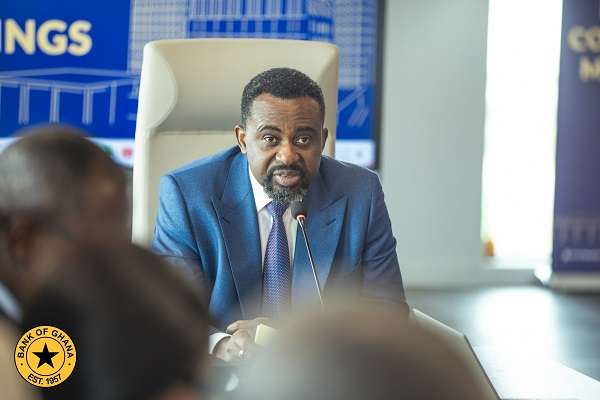The Governor of the Bank of Ghana, Dr Johnson Asiama has stated that Ghana’s economy is showing early signs of stabilisation, supported by recent policy measures and improving economic fundamentals, both domestic and external.
He made these remarks during the opening of the 124th Meeting of the Monetary Policy Committee (MPC) in Accra on Wednesday, May 21, 2025.
“We convene at a time when Ghana’s macroeconomic conditions are exhibiting early signs of stabilization, supported by recent policy actions and improving external and domestic fundamentals,” Dr Asiama stated.
However, he was quick to caution that “the path ahead remains complex and fraught with risks, both global and domestic.”
The Governor highlighted recent developments in the economy, including a notable decline in inflation and a strong appreciation of the cedi.
According to the Ghana Statistical Service, inflation dropped to 21.2% in April 2025, down from previous highs, although it remains above the Bank’s medium-term target of 8 ± 2%.
“In March, the Committee responded decisively to the inflation outlook by raising the policy rate by 100 basis points to 28 percent. Preliminary evidence suggests this action has contributed to dampening inflation momentum,” Dr Asiama said.
He noted that the Ghanaian cedi had appreciated sharply by nearly 19% between April and May, a development he credited to prudent monetary policy, improved market sentiment, and gains in the external sector.
“This appreciation has helped ease imported inflation pressures and restore public confidence,” he added.
Dr Johnson Asiama also referenced Ghana’s recent progress under the IMF’s Extended Credit Facility (ECF) programme.
“Ghana has reached a Staff-Level Agreement with the IMF on the Fourth Review of the ECF Programme… the trajectory is clearly positive,” he noted.
Additionally, the recent S&P credit rating upgrade from Selective Default to CCC+ was cited as further affirmation of economic progress.
Despite these gains, the BoG Governor acknowledged ongoing challenges, particularly concerning inflation risks from food supply constraints, global commodity price volatility, and geopolitical tensions, including the recent US-led tariff disputes.
In response, he mentioned that the Bank is revising its monetary policy implementation framework, moving away from the reliance on the unremunerated Cash Reserve Ratio to more active Open Market Operations using longer-tenor instruments.
“This is intended to enhance policy transmission, improve liquidity management, and allow greater room for credit expansion to the private sector,” Dr Asiama explained.
He also emphasised the importance of the Committee’s policy decisions and the need for clear communication.
“Our post-meeting communiqué must clearly articulate the rationale behind our policy decisions and provide an accessible, transparent account of recent economic trends,” he urged.
As the MPC Committee meets to deliberate on the appropriate monetary policy stance going forward, Dr Asiama posed key questions:
• Is the observed exchange rate appreciation sustainable?
• How durable is the nascent return of market confidence?
• What are the implications of these dynamics for our inflation forecast over the medium term?
He concluded his remarks by calling on members to approach their deliberations with professionalism and rigor.
“Our credibility depends on our ability to respond decisively and proportionately to evolving economic realities,” the BoG Governor rallied.
The Monetary Policy Committee of the Bank of Ghana (BoG) will on Wednesday, May 21, 2025, begin its 124th meeting to review recent macroeconomic developments and assess the country’s economic outlook.
This meeting is significant as it comes on the back of recent gains by the Ghana Cedi against the US dollar and ongoing efforts to tame inflation.
At its last meeting, the MPC increased the monetary policy rate by 100 basis points to 28 percent.
Already, some market watchers expect the BoG to maintain the policy rate at 28 percent, with any potential cuts dependent on continued disinflation.
The MPC’s decision on the policy rate will have implications for lending costs, investor confidence, and overall economic activity.
The meeting will conclude with a press briefing on Friday, May 23, 2025 to provide further clarity on the central bank’s monetary stance and the measures it intends to take in sustaining economic stability.
MA
Watch the latest edition of BizTech below:
Click here to follow the GhanaWeb Business WhatsApp channel
